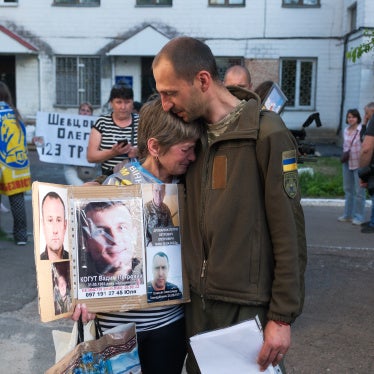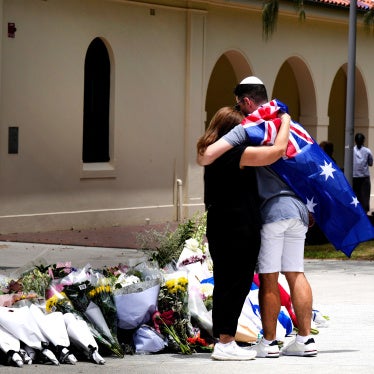(New York) - One year after King Gyanendra unilaterally assumed full executive authority, the human rights situation in Nepal has dramatically spiraled downwards, Human Rights Watch said today. It called on the king to return power to an elected civilian government and to resume the role of constitutional monarch assigned to him by the constitution.
Since the king’s coup on February 1, 2005, government military and security agencies have summarily suspended or ignored civil and political rights, and continued to engage in the practice of “disappearances,” marking Nepal as the country with the highest number of cases reported to the United Nations. Security forces arbitrarily arrested over 3,000 political activists, journalists, and students. Conflict-related civilian casualties continued at the same pace as before the coup, with the exception of a four-month ceasefire unilaterally declared by the Maoists that ended on January 2. Security forces killed more than 1,000 people over the last year, including civilians, while Maoists were responsible for at least 600 deaths. The king issued numerous decrees to overcome the constitution or legislation that limited his authority.
“While King Gyanendra says he is committed to multi-party democracy and constitutional rule, his actions show that he plans to remain in power,” said Brad Adams, Asia director at Human Rights Watch. “It is time for him to step aside and allow the country’s political parties and civil society to work to end the crisis.”
Since the coup, the political and human rights situation in the country has worsened. Some of the most severe problems include:
Censorship and Attacks on the Media
The new government has systematically attacked the media through censorship and oppressive laws, making free press in Nepal virtually obsolete. Reporters Without Borders reported at least 273 cases of arrests of journalists and 569 cases of censorship in 2005 occurred in Nepal—half of the total cases of censorship reported worldwide. On October 9, the king issued a media ordinance banning any news broadcast on radio. In addition, the ordinance affects other forms of media as well. The right of political parties to provide information on their programs during election periods was weakened without explanation. Journalists’ licenses can be cancelled summarily and defamation provisions that include harsh criminal penalties have been extended to cover broadcast media.
Attacking Civil Society
In November, the government issued a Code of Conduct for Social Organizations. It prohibits any activity endangering “social harmony” and bars staff of nongovernmental organizations from having political affiliations, preventing all politically active persons from NGO work. It also attempts to control the places NGOs can work and makes all staff of an NGO legally responsible for its activities, even if an individual is not involved in that activity. Such provisions violate international legal protections for freedom of expression and freedom of association. The Code can be used to curtail the work of human rights workers and organizations that have been documenting abuses in spite of sustained attacks against them since the coup.
Arbitrarily Limiting Political Activity
Rights of assembly and association have been suspended. Signs of dissent have led to swift and arbitrary arrests. Opposition politicians have been branded as “terrorists,” and the constitution itself was declared an “obstacle” by the Deputy Vice Chairman of the King’s Council of Ministers, Tulsi Giri.
Ending the Independence of the National Human Rights Commission
The commission had spearheaded investigations into violations of international human rights and humanitarian law by the government and Maoist rebels. After the coup, the government set up a new body to appoint commission members and staffed it with persons sympathetic to the king. In a continued effort to sideline the commission, the government also set up a parallel nine-member Human Rights Committee.
Sidelining the Judiciary
Nepal’s judiciary was gravely weakened after the coup, as senior judges came under pressure to support the government takeover and many lawyers who challenged arbitrary government action faced harassment and even arrest. The security forces continue to ignore judicial orders to release those detained. Nepali human rights groups have documented some 60 cases of people who were rearrested immediately after they were ordered released by the courts.
Failing to Protect Civilians from the Insurgency
Despite justifying the coup on the pretext of trying to curtail the ten-year-old insurgency, the king failed to improve protection of civilians, particularly those in the countryside, caught in the armed conflict between the government and the Maoists. Nepalis have no judicial or other protective remedies from the atrocities committed by both sides. The Maoists declared a unilateral ceasefire on September 3, leading to a decline in atrocities. The government did not reciprocate the ceasefire leading the Maoists to resume hostilities after four months and launch a series of coordinated attacks on urban areas, including Kathmandu. Nepali human rights groups documented at least 66 people killed in the month after the ceasefire ended.
“If the purpose of the coup was to end the Maoist insurgency, then it has been a failure,” said Adams. “The insurgency shows no signs of abating, and the government’s security forces seem as far from a military victory as ever.”
In an attempt to give a legal sheen to the new system, the king’s imposed government quickly put in place ordinances granting itself wide powers to sweep aside all legal challenge. Although the state of emergency was lifted in April, the Kathmandu District Authority then issued an order against public gatherings, meetings, or any kind of protest in public spaces and on roads. Local officials were also given the authority to intervene in any “political program” involving more than two people.
“New laws cannot hide the fact that the constitution has been peremptorily put aside,” said Adams. “There is no way out of this crisis but a return to constitutional and representative rule.”
Background
Although King Gyanendra suspended elected government on October 4, 2002, he maintained a veneer of democratic governance by appointing cabinets comprised of members of the main political parties. However, on February 1, 2005, the king declared a state of emergency and announced his assumption of full executive authority, and appointed a cabinet comprised largely of members of the pre-democratic Panchayat party. In a fiercely dramatic display of authority, he shut down the airport, closed off all fixed and mobile telephone lines and internet services, and ordered military oversight of all media. All FM radio stations, often the only source of information in the mountainous country, were shut down. Any news items portraying the king’s acts or acts by other members of the royal family in a negative light were expressly forbidden.
During the past year, the country’s most senior active political leaders, including Sher Bahadur Deuba, the dismissed Prime Minister and chairperson of the Nepali Congress (Democratic) party; Madhav Kumar Nepal, secretary-general of the (mainstream and non-violent) Communist Party of Nepal-UML; and Girija Prasad Koirala, chairperson of the Nepali Congress Party, were placed under house arrest. While under house arrest, they were not allowed to receive guests, read newspapers, listen to the radio or television, or make phone calls. In addition, hundreds of local political leaders, human rights defenders and student activists were arrested throughout the country.





